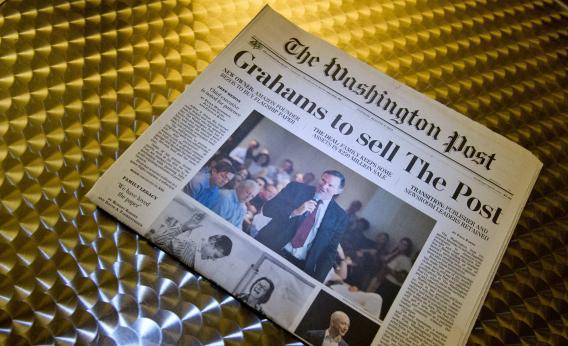A question that’s come up in a number of discussion I’ve had with people is how closely can a Jeff Bezos-owned Washington Post align itself with Amazon’s business strategies? In other words, what’s the practical difference between being a subsidiary of a company Bezos runs and being owned by Bezos personally?
There are two ways of breaking this down. One is how can Bezos change the Post’s strategy to help Amazon? The other is how can Bezos change Amazon’s strategy to help the Post?
The answer to the former question is that Bezos can pretty much do whatever he wants with the Post. It’s his company. No partners, no shareholders, no minority investors. He can’t do anything illegal and he has a labor union to contend with. But if he wants to use his private property in a way that’s somehow beneficial to Amazon, nobody would have much grounds to stop him. In theory, you could dream up some kind of scenario where you’d have an anti-trust issue, but any issue along those lines would exist if the Post were an Amazon subsidiary too.
The big difference runs in the opposite direction. If the Washington Post were a subsidiary of Amazon, then the Post could spend more money on news production than it earns in advertising and subscription revenue. The gap could be made up for by profits that Amazon makes elsewhere. The rationale for that kind of cross-subsidy could be that a Post subscription is part of the Amazon Prime bundle, or that the Post’s D.C.-area newspaper operation is being run as an experimental arm of Amazon’s larger parcel-delivery service. Lots of Internet speculation about Post/Amazon relations is thinking along these lines. The fascinating thing about major newspapers is that even though they’re a really big deal culturally and socially, the actual sums of money involved are small compared to the revenues of big West Coast technology giants. So you could easily imagine a scenario in which Amazon’s Washington Post subsidiary was a loss-leading portion of some larger business strategy.
But here’s where separation becomes a problem. Imagine you’re the CEO of a big company. You also as a private individual own a vending machine company. If you use your authority as CEO to cut a bunch of sweetheart deals for your vending machine company, then you’re going to get into hot water with shareholders. You are violating your obligations to the company by, in effect, tunneling profits out of the firm you manage into a firm that you control. Now these things do happen. In the 19th century, American railroad entrepreneurs were known to rip-off British railroad investors in exactly this way. Money would be funneled out of British-bracked railroad construction companies and into subcontractors that the American entrepreneur owned on the side. But this kind of thing is illegal.
So this is where the rubber hits the road. If Bezos had Amazon aquire the Post, he might have had some trouble selling shareholders on his vision of the synergies. But by buying the company separately, Bezos has created a situation where any synergy strategy that seems to involve Amazon subsidizing the Post’s operations is an even harder sell for Amazon shareholders. Now, of course it’s true that Bezos can always cover losses at the Post personally. But it’s worth recalling that when we say Bezos has $20 billion that doesn’t mean he has that much cash in a bank account. His fortune is mostly shares in Amazon. And while he’s legally free to sell shares to raise money (that’s how he bought the Post), in practice a corporate founder who’s also CEO probably can’t be constantly selling shares in his own company in order to finance a separate company without prompting panic and demoralization. Exactly how much selling you can do before people start to raise question is hard to say. Certainly he can afford to cover years worth of Post losses. But the point is that as a freestanding company, the Post’s role can’t be to serve as a loss-leader for other Amazon services in the way that it could as a subsidiary.
To steal a point from a colleague, one angle that people should consider is the possibility that it’s the Post that preferred to sell to Bezos personally rather than Bezos preferring to buy personally. They might feel it looked better to sell to a private individual than to a publicly traded company, and Bezos might have decided that the hassles involved in having separate firms just aren’t that big a deal. After all, nothing is really stopping him from selling the newspaper to Amazon in 18 months.
